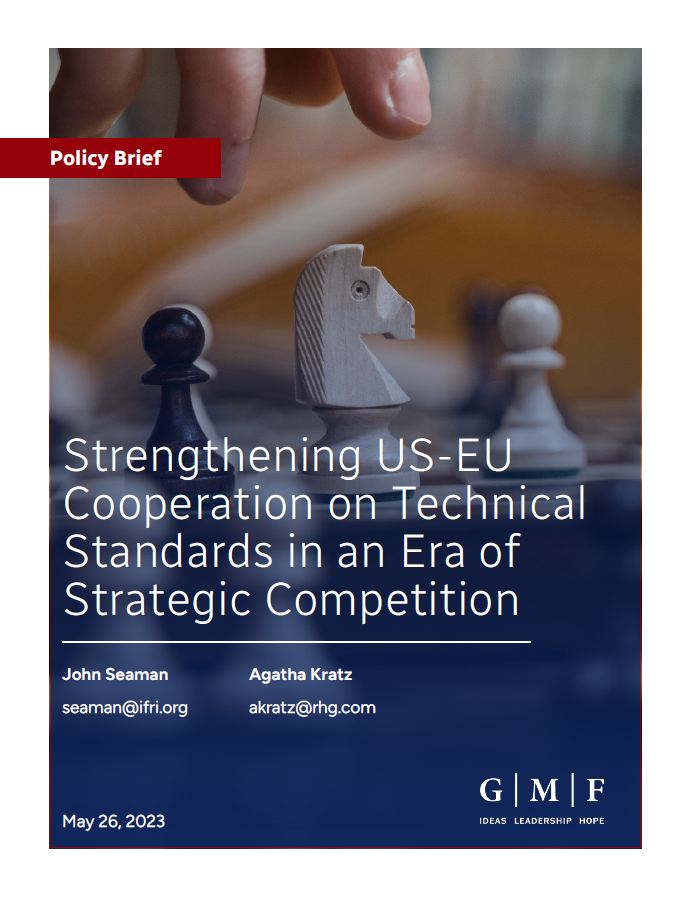Strengthening US-EU Cooperation on Technical Standards in an Era of Strategic Competition

Transatlantic ties have had a rough go in recent months. After an unprecedented degree of alignment on Russia in the first half of 2022, including the quick and efficient rollout of a series of groundbreaking sanctions packages, the United States and Europe stepped back into dispute territory with the fallout from measures taken by Washington, notably some key provisions of the pathbreaking Inflation Reduction Act (IRA) passed last summer.
This has again strained transatlantic cooperation and affected the potential for US-EU alignment, particularly around China and technology and trade issues. Recent US actions have amplified the divide between “Atlanticists” and “strategic autonomists” and made it harder for Europe to follow in Washington’s footsteps on, for example, export controls or outbound investment screening. Even though both issues are on the table, as European Commission President Ursula von der Leyen confirmed in her recent China speech, coordinated moves on these fronts could now be seen as bowing to US pressure in a context of perceived green-technology unilateralism.
Against this background, the December 2022 US-EU Trade and Technology Council (TTC) meeting can be seen as a missed opportunity. The TTC had, starting in September 2021, a productive and collaborative first year, but recently some of the most relevant transatlantic discussions have been happening outside the council’s framework. These include negotiations on IRA interpretation and carve-outs, and on export controls on semiconductor technology.
International technical standards, however, is one key aspect of transatlantic cooperation that is moving forward on a strong footing, with significant implications. Over the past 18 months of TTC work, the two sides have managed to build a solid foundation for engagement on the topic, from increased information sharing to the identification of key sectors for collaboration to fruitful collective action on recent International Telecommunications Union (ITU) leadership elections. This happened despite longstanding disagreements on ways to approach international standards development, the role of “harmonized standards”, for instance in the context of the EU’s regulatory framework for artificial intelligence (AI), and US criticism of the EU’s new standardization strategy.
Sometimes overlooked, collaboration on international technical standards is important in the current context of heightened technological competition. A highly technical workstream, international technical standards play a key role in defining future technological pathways. China’s increasing involvement in global standard setting makes transatlantic cooperation in the field crucial and increases the need for a common, strategic approach. Without careful coordination, there is a risk that the current, broad-based pushback against China could spill into the standards sphere and impede the important work of global standards organizations. There is, therefore, a need to strike a balance between strategic competition and an interest-driven approach that can ultimately uphold the benefits of collaborative global standards development.
On the heels of the G7 summit in Hiroshima, and ahead of the next TTC meeting in Sweden on May 30-31, both of which have international technical standards on their agendas, we lay out the case for why and how the United States and the EU can build on achievements in this area to maintain constructive engagement and attain concrete, ambitious results. We begin by explaining why preserving global technical standards is crucial to economic competitiveness and strategic objectives on both sides of the Atlantic (Part 2) and explore China’s increased involvement in the field (Part 3) before laying out six avenues for continued transatlantic cooperation on technical standards (Part 4).
>>> Download the article on GMF's website.
Related centers and programs
Discover our other research centers and programsFind out more
Discover all our analysesThe U.S. Policy Toward Taiwan Beyond Donald Trump: Mapping the American Stakeholders of U.S.-Taiwan Relations
Donald Trump’s return to the White House reintroduced acute uncertainty into the security commitment of the United States (U.S.) to Taiwan. Unlike President Joe Biden, who repeatedly stated the determination to defend Taiwan, President Trump refrains from commenting on the hypothetical U.S. response in the context of a cross-Strait crisis.

China’s Strategy Toward Pacific Island countries: Countering Taiwan and Western Influence
Over the past decade, China has deployed a diplomatic strategy toward the Pacific Island Countries (PICs). This strategy pursues two main objectives: countering Taiwan's diplomatic influence in the region and countering the influence of liberal democracies in what Beijing refers to as the "Global South."

Opening up the G7 to South Korea to Address Contemporary Global Challenges
The G7’s global influence has diminished as powers like China reshape international governance through initiatives such as BRICS and the Shanghai Cooperation Organisation (SCO). With the G7 now representing just 10 per cent of the world’s population and 28 per cent of global GDP, its relevance is increasingly questioned.
Expanding SPDMM as a pivotal institution in the Pacific – A French perspective
The South Pacific Defence Ministers’ Meeting (SPDMM) is the only forum that brings together defense ministers from the wider South Pacific — including Chile, which is hosting it for the first time. This heterogeneous group of countries with varying resources, capacities, and interests — Australia, Chile, Fiji, France, New Zealand, Papua New Guinea (PNG), and Tonga — are united by their shared determination to strengthen cooperation on maritime security and humanitarian assistance and disaster relief (HADR) activities.










